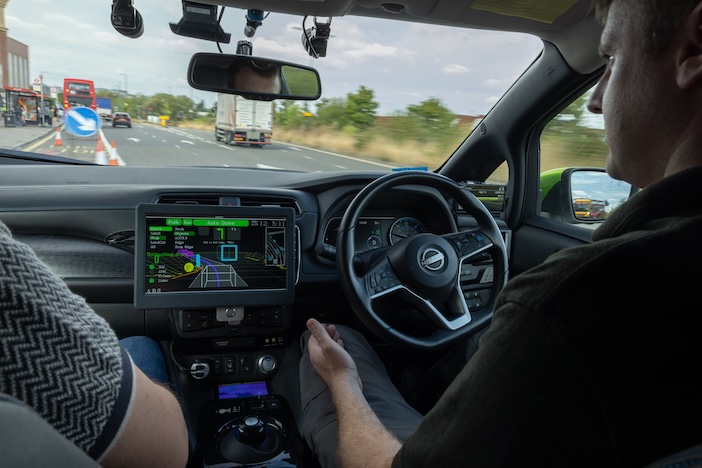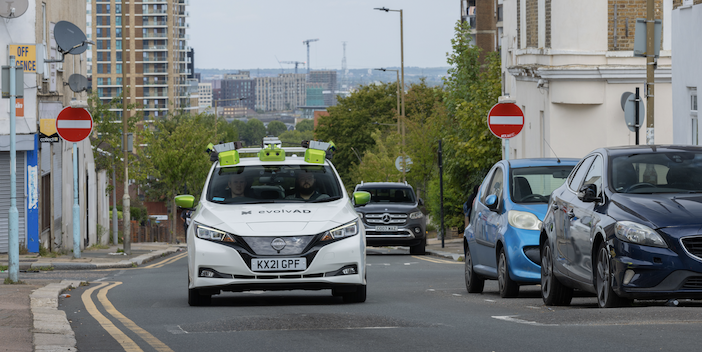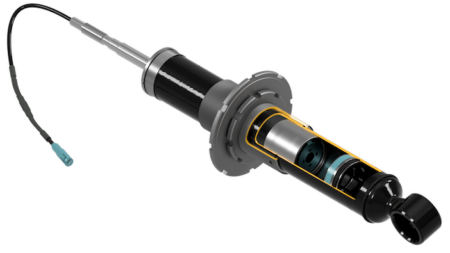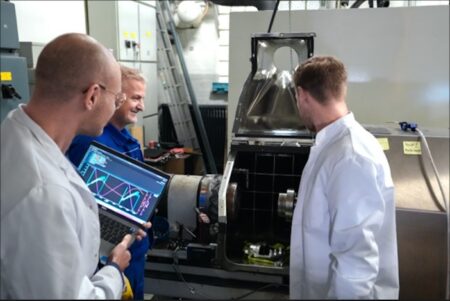A consortium of five industry partners reports it has successfully completed an autonomous driving (AD) research project – claimed to be the most rigorous ever conducted in the UK. The project, titled evolvAD, builds on previous Nissan-backed projects in the UK – HumanDrive and ServCity – and marks the end of an intensive eight-year period during which more than 16,000 autonomous miles were driven by Nissan LEAFs equipped with AD technology across the country’s motorways, urban centres, residential streets and countryside. And those miles did not involve any accidents.
David Moss, senior vice president, region research & development for Nissan AMIEO (Africa, Middle East, India, Europe, and Oceania) said: “All three research projects have been tremendously successful in driving our knowledge and understanding of how AD technology performs across challenging driving environments. It has been a privilege working with our dedicated partners to advance AD mobility. As well as making driving safer by reducing human error, and cleaner by improving efficiency, this technology can give many more people access to mobility who may not have it today due to location, age or disability.”
Rigorous road tests
During evolvAD, Connected and Autonomous Vehicles (CAVs), were tested in various simulators and on private test-tracks before being introduced onto urban residential and rural roads for what the partners say was the most rigorous test of AD technology ever conducted in the UK.
These road types present unique challenges for AD technology, including low-speed driving on narrow, single-lane roads in urban residential areas. For higher speed routes on winding roads with no markings in rural areas, Nissan has introduced a chassis control system for the AD vehicle to enhance the brakes and steering, to allow it to perform as an Advanced Driver.
Using infrastructure such as CCTV on residential streets, the evolvAD CAVs received information to improve situational awareness, creating a unique test study on how vehicle to infrastructure (V2I) can be used to enhance the performance of CAVs, as well as developing all-new V2I technologies.

The players
Nissan was technical lead for evolvAD, which was jointly funded by government and the consortium partners. Over 21 months, the five consortium partners – Nissan, Connected Places Catapult, Humanising Autonomy, SBD Automotive and TRL – worked to technically support UK supply chain readiness for future mass-deployment of AD technologies in the UK.
Connected Places Catapult specialises in applying advanced machine-learning techniques to generate high-definition maps from aerial imagery, while Humanising Autonomy specialises in advanced vulnerable road user (pedestrians, cyclists and motorcyclists) perception and behaviour estimation capability, SBD Automotive works with on-board cyber security and advanced safety cases, and TRL further develops vehicle system validation processes utilising infrastructure on the Smart Mobility Living Lab (SMLL) testbed.
Part of the project backing came from the UK government’s £100m Intelligent Mobility fund, which is administered by the Centre for Connected and Autonomous Vehicles (CCAV) and delivered by the UK’s innovation agency, Innovate UK.
The programme forms part of a bigger body of work at Nissan. Nissan is conducting ‘Autonomous mobility service’ research in Japan (Nissan Research Centre), the UK (Nissan Technical Centre Europe), and the US (Nissan Advanced Technology Centre, Silicon Valley). This research includes the latest ‘Easy Ride’ Serena AD vehicle testing in Yokohama, Japan, where the company is aiming to launch autonomous mobility services.
evolvAD contributes to Nissan’s ongoing global development of autonomous mobility, sharing insights and data to understand how the technology can be tailored to perform safely across different driving conditions worldwide.
With the evolvAD project successfully concluded, the next phase of AD deployment will assess the readiness of cities and regions across the UK for the future introduction of AD systems and services.
Robert Bateman, project manager for evolvAD and manager of the research and advanced engineering team at Nissan Technical Centre Europe (NTCE), said: “Following the successful conclusion of evolvAD and previous projects, we are now shifting towards studying the readiness of the UK to introduce AD systems.
“Again, working with partners, we need to develop a 360-degree understanding of infrastructure and regulatory needs across the country, and provide critical insights to policy-makers and urban planners to ensure a successful introduction of AD mobility services in the right way and at the right time.”





